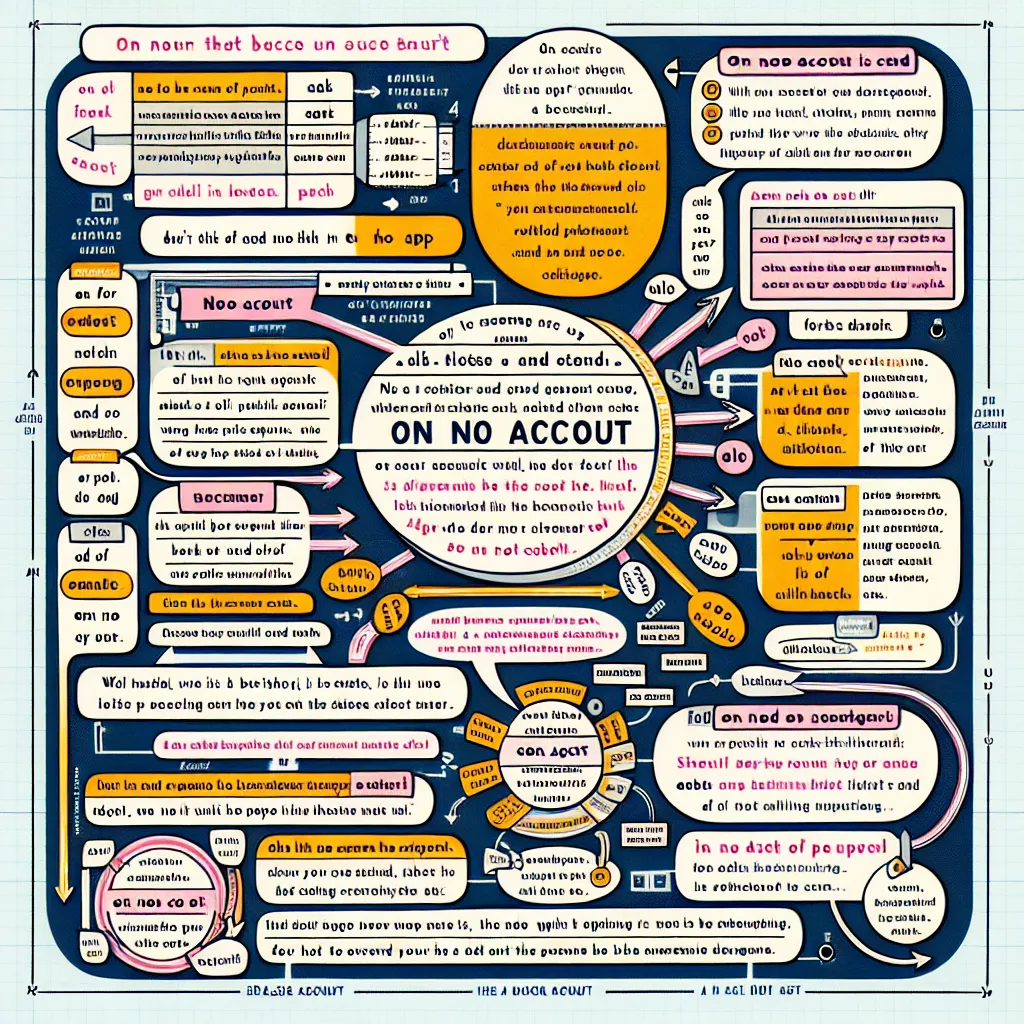“On no account” is a powerful and formal expression that can significantly enhance your IELTS score when used correctly. This phrase is particularly useful in the Writing and Speaking sections of the IELTS test, where demonstrating a wide range of vocabulary and complex grammatical structures is crucial. Let’s delve into the proper usage and application of this phrase in the context of IELTS.
Understanding “On No Account”
“On no account” is an emphatic way of saying “under no circumstances” or “absolutely not.” It’s used to express a strong prohibition or to emphasize that something must not happen or be done. This phrase is particularly useful in IELTS tasks that require you to express opinions, give advice, or discuss rules and regulations.
Grammatical Structure
The basic structure for using “on no account” is:
On no account + should/must + subject + verb
For example:
- On no account should you leave your belongings unattended at the airport.
- On no account must the confidential information be shared with unauthorized personnel.
It’s important to note that “on no account” is typically placed at the beginning of a sentence for emphasis, followed by inverted word order (auxiliary verb before subject).

Using “On No Account” in IELTS Writing
In IELTS Writing, particularly in Task 2 essays, using “on no account” can demonstrate your ability to use advanced vocabulary and complex structures. This can contribute to a higher score in the Lexical Resource and Grammatical Range and Accuracy criteria.
Task 2 Essay Example
Consider this example in an essay about workplace safety:
“Ensuring employee safety is paramount in any organization. On no account should companies compromise on safety measures to cut costs. Doing so not only puts workers at risk but also exposes the company to potential legal repercussions and reputational damage.”
Analysis: This sentence effectively uses “on no account” to emphasize the importance of workplace safety. It demonstrates a high level of vocabulary and grammatical control, which are key factors in achieving a high band score in IELTS Writing.
Task 1 Report Example
While less common in Task 1, “on no account” can still be used in certain contexts, such as describing strict rules or procedures:
“The graph illustrates the safety protocol for handling hazardous materials in a laboratory. On no account must researchers handle these substances without proper protective equipment, as indicated by the 100% compliance requirement shown in the data.”
Analysis: This usage shows the ability to interpret data and express absolute rules, which can impress IELTS examiners looking for sophisticated language use.
Incorporating “On No Account” in IELTS Speaking
In the Speaking test, using “on no account” can showcase your ability to use idiomatic and emphatic language, potentially boosting your score in the Fluency and Coherence and Lexical Resource criteria.
Part 2 Example (Cue Card)
Topic: Describe a rule that you think is very important.
“I’d like to talk about a crucial road safety rule. On no account should drivers use their mobile phones while operating a vehicle. This rule is absolutely essential because distracted driving is a leading cause of accidents. Even a moment’s inattention can lead to catastrophic consequences, so it’s vital that this rule is strictly enforced and followed by all motorists.”
Analysis: Using “on no account” in this context emphasizes the speaker’s strong belief in the importance of the rule, demonstrating both advanced vocabulary and the ability to express opinions clearly.
Part 3 Example (Discussion)
Question: What are some safety measures that should be taken in schools?
“Well, there are several critical safety measures that schools should implement. First and foremost, on no account should strangers be allowed to enter school premises without proper authorization. This is crucial for protecting students from potential threats. Additionally, schools must have clear emergency procedures in place, and on no account should these drills be neglected or taken lightly.”
Analysis: This response uses “on no account” twice, showing the ability to emphasize different points within the same answer. It demonstrates a high level of language control and the capacity to discuss complex topics fluently.
Advanced Usage for Higher Band Scores
To aim for band scores 7 and above, consider these advanced applications of “on no account”:
-
Combining with other structures:
“On no account should the government neglect environmental protection, nor should it prioritize economic growth at the expense of ecological balance.” -
Using in hypothetical situations:
“If we were to face a similar crisis in the future, on no account should we repeat the mistakes of hasty decision-making and poor communication.” -
In reported speech:
“The manager emphasized that on no account were employees to disclose confidential information to competitors.”
Common Mistakes to Avoid
-
Incorrect word order:
Incorrect: “On no account you should leave early.”
Correct: “On no account should you leave early.” -
Using with modal verbs other than “should” or “must”:
Incorrect: “On no account can you enter without permission.”
Correct: “On no account should you enter without permission.” -
Overuse:
While “on no account” is a powerful phrase, overusing it can make your speech or writing sound repetitive. Use it sparingly for maximum impact.
Conclusion
Mastering the use of “on no account” can significantly enhance your IELTS performance, particularly in Writing and Speaking. Remember to use it to express strong prohibitions or emphasis, and always pay attention to the correct grammatical structure. Practice incorporating this phrase into your responses for various IELTS topics, such as education, environment, technology, and social issues. By doing so, you’ll demonstrate a sophisticated command of English, potentially boosting your band score across multiple criteria.